Feb 15, 2014
Anarchism & Anarcho-Syndicalism
An Introduction to Anarchism
 “..As a practice and over-arching worldview Anarchism is fundamentally about sticking up for each other – against the whims of
“..As a practice and over-arching worldview Anarchism is fundamentally about sticking up for each other – against the whims of 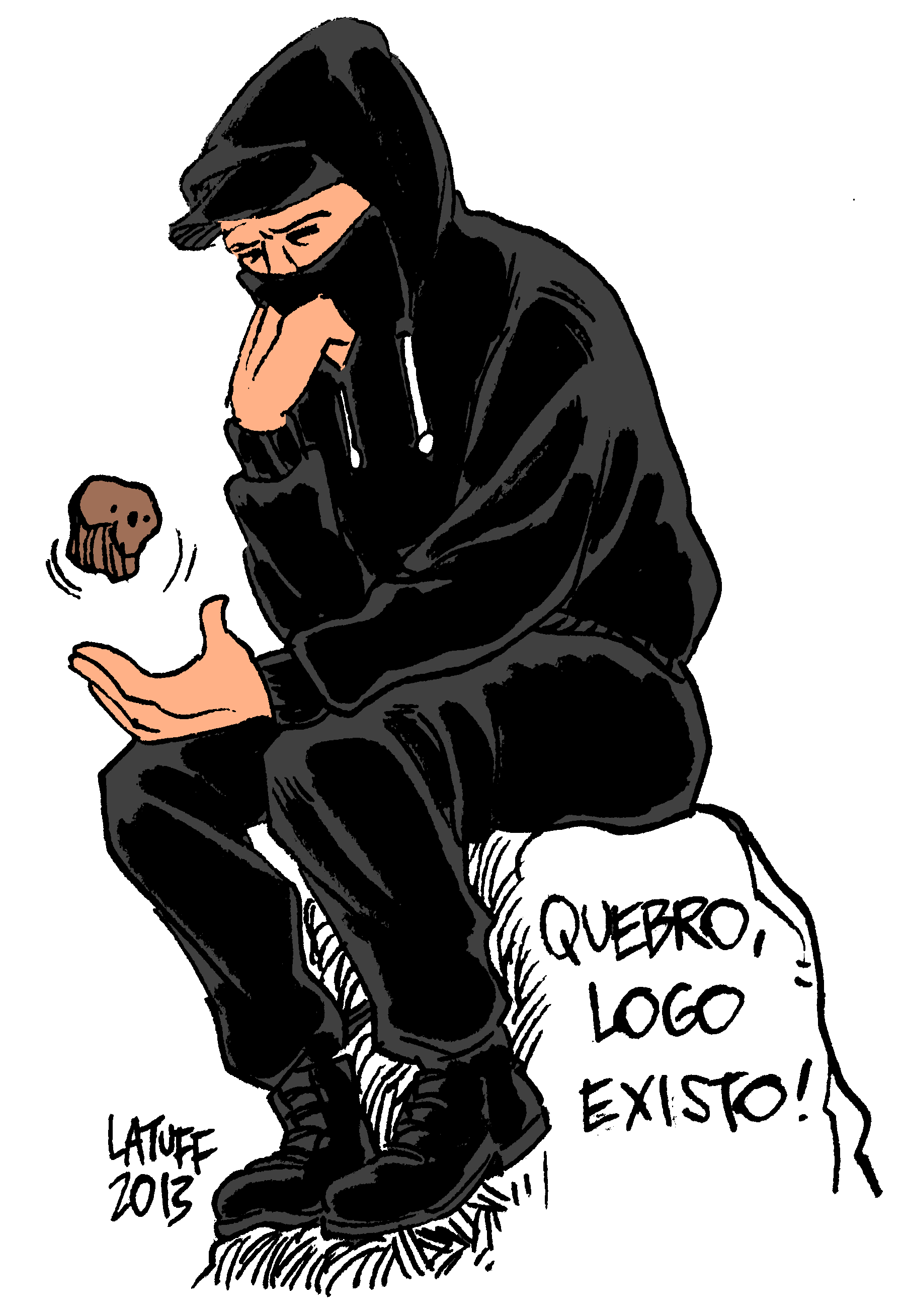 bosses, landlords and bureaucrats, against systemic and psychological systems of social control, against racism, sexism and other forces that hold illegitimate power over our lives. At the same time anarchist theory looks at how we can organise ourselves and our struggles in a way that reflects the kind of society we want to see, and the nuts and bolts of doing this in such a way so that our movements can’t be demobilised or sold out from above, or used as trampolines for political careerists, NGO’s and those who seek to become representatives over and above the people.
bosses, landlords and bureaucrats, against systemic and psychological systems of social control, against racism, sexism and other forces that hold illegitimate power over our lives. At the same time anarchist theory looks at how we can organise ourselves and our struggles in a way that reflects the kind of society we want to see, and the nuts and bolts of doing this in such a way so that our movements can’t be demobilised or sold out from above, or used as trampolines for political careerists, NGO’s and those who seek to become representatives over and above the people.
None of this theorising matters if we don’t try to implement our ideas beyond the realm of traditional Activist politics and into the areas of our lives where we experience exploitation most directly: in our workplaces and neighbourhoods. Against the social order that demeans our human dignity, we need more and better organisers, and we need the confidence and support to make attempts where in the past we have laid down and been walked over. At the same time we need to make attempts at forming the organisations and infrastructure necessary to build a healthy culture of working class hospitality, resistance and sustenance..”

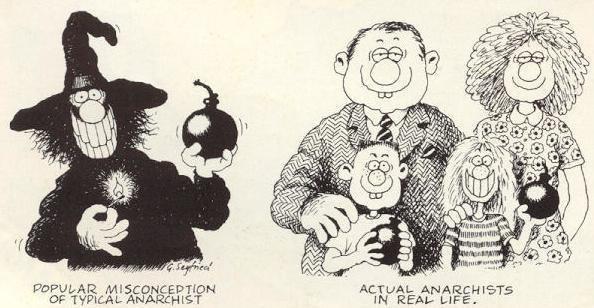
As a set of ideas, Anarchism didn’t just fall from the sky or come from the head of this or that intellectual. It largely developed from the lessons, histories and practices of revolutionary self-organisation, firmly rooted in the class struggle. The term ‘Anarchism’ comes from the Greek ‘ἄναρχος’, roughly meaning ‘Without Rulers/Without Domination’ . Anarchism is a way of organising, a set of ideas, a world-view, as well as a tendency in history which formally developed primarily as a working-class response to Capitalism and class society, the economic system which now dominates the world.
As a broad body of thought Anarchism looks to increase the free unfolding of social life against hierarchy, authoritarianism, oppression and domination – the cultural, traditional and psychological systems of obedience and command, and the economic and political systems tied to capitalist class society and the State.
To get a grip on Anarchism first we have to understand it as a response to both the tensions under Capitalism, as well as broader systems of oppression tied to class society; patriarchy, colonialism, white supremacy, racism etc . In this sense Anarchism developed as the libertarian wing of the socialist movement. As a system capitalism is based fundamentally on endless expansion and the accumulation of capital – basically investing money to make more money. In the name of profit the system and the tiny minority ruling/owning class who benefit from it commit numberless atrocities as a matter of routine daily functioning, and continue to ever-increasingly threaten us with ecological ruin and the destruction of the entire planet.
In all parts of the world capitalist system, there are those who are in a position of power and privilege – heads of business, generals or bureaucrats, together with those who own capital but perform no social function at all, who through their class position have a vested interest in maintaining the system. Many of the roots of the problems we see all around us today are the direct result of our powerlessness – our deliberate disempowerment and exclusion from decision making power over our own lives and our institutions. All over the place there is constant pressure to make people feel that they are helpless, that the only role they can have is to ratify decisions and to consume. This alienation and the domination of a powerful minority acting over the majority has been brought about by the violent development of hierarchical, bureaucratic bodies (eg: the State) which concentrate power in the hands of a ruling class which acts separately from, external to, ‘above and over’ the general population.
The official channels through which we are supposed to be able to control society-parliamentary elections, pressure groups, trade-unions, personal consumption habits, public discussion – appear more and more useless. Ritually, we’re allowed to vote in a rotating set of State managers, but ultimately decision making power, resources, the media and the things we need to survive are controlled by a tiny elite and their corporate empires that are private, unaccountable and beyond any meaningful level of popular control or debate. At the same time it’s the vast majority of society – workers, the unemployed etc, that have potentially the greatest power of all. If we refuse to work, the country stops. If we ‘dump the bosses off our back’ and take control of our own activity, our own work, on our own terms, we thereby begin to take back control of society.
Today, power means the unaccountable power of some people to tell others what to do in the name of profit. The power we see rising is the power of people directing their own action cooperatively toward common purposes – the tendencies toward self-management and towards solidarity which constantly surface in revolt throughout history. These are tendencies, the ‘seeds beneath the snow’ which if extended could form the basis of a new society. The administration of things from below instead of Government from above.
“We are so perverted by an education which from infancy seeks to kill in us the spirit of revolt, and to develop that of submission to authority; we are so perverted by this existence under the ferule of a law, which regulates every event in life— our birth, our education, our development, our love, our friendship — that, if this state of things continues, we shall lose all initiative, all habit of thinking for ourselves. Our society seems no longer able to understand that it is possible to exist otherwise than under the reign of Law, elaborated by a representative government and administered by a handful of rulers; and even when it has gone so far as to emancipate itself from the thraldom, many times over its first care had been to reconstitute it immediately.”
—Murray Bookchin, The Ecology of Freedom
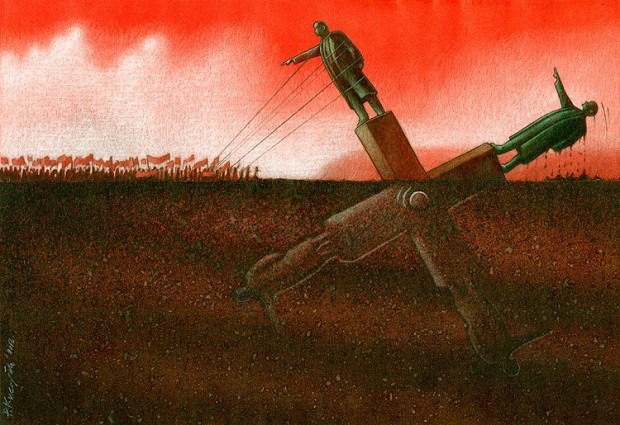
“..Every revolt evaporates and leaves behind only the slime of a new bureaucracy..”
Once we enter the workplace, the school, the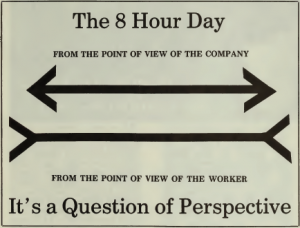 rental property, we inevitably find ourselves enmeshed in the direct and personal relations of rulers and ruled. Indeed, the work site is where we often experience the most immediate, unambiguous, and tangible relations of power that most of us will encounter on a daily basis. The mystery here is not that we are required to work, or that we are expected to devote so much time and energy to its pursuit, but rather that there is not more active resistance to this state of affairs. The modern ideal of a ‘flexible, casualised workforce’ is that the worker adapts to the economic cycle, facing overwork in periods of business expansion and unemployed desperation in recessions.
rental property, we inevitably find ourselves enmeshed in the direct and personal relations of rulers and ruled. Indeed, the work site is where we often experience the most immediate, unambiguous, and tangible relations of power that most of us will encounter on a daily basis. The mystery here is not that we are required to work, or that we are expected to devote so much time and energy to its pursuit, but rather that there is not more active resistance to this state of affairs. The modern ideal of a ‘flexible, casualised workforce’ is that the worker adapts to the economic cycle, facing overwork in periods of business expansion and unemployed desperation in recessions.
The quality of work—its mad pace, its stultifying monotony, its corrosive stupidity, its degradation of sociability and spirit. The never-ending torment of wage labour is not just for the sheer sake of it—or because of the “work ethic”—but is linked to capital’s need to valorize fixed capital expenditures by keeping plant and equipment running at all times, making the worker ever more servile to the pace and demands of machines. It is a measure of capitalism’s strangulation of human progress that its enormous development of technology does not serve to alleviate burdensome toil but increases it. As our lifetime increases, so does our working life – the most vigorous years of life – and our retirement age. Work performance is gauged by the minute—even by nanoseconds in today’s world—so that also the length of what constitutes the social norm for working time has expanded. No longer based merely on the 8-hour day, work time is now calculated according to the week, the year, the lifetime. And what exactly is a worker entitled to after having had nerves and muscles depleted in the service of another’s wealth? A slow wait for death while being constantly reminded how expensive it is to maintain those who no longer contribute to the GDP.
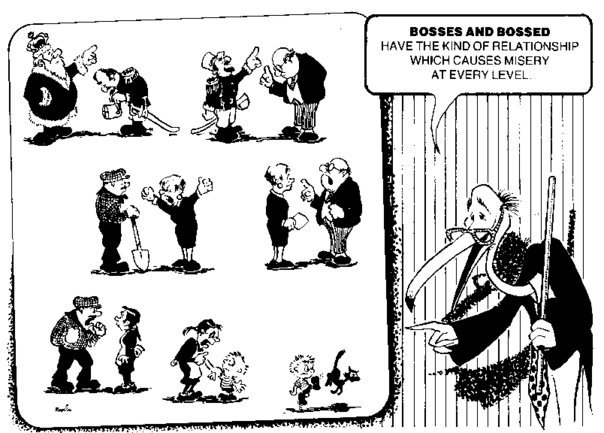
“Anarchism, then, really stands for the 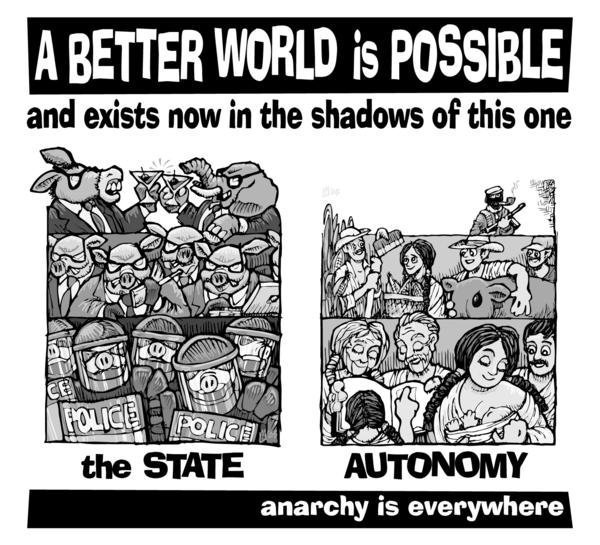 liberation of the human mind from the dominion of religion; the liberation of the human body from the dominion of private property; liberation from the shackles and restraint of government. Anarchism stands for a social order based on the free grouping of individuals for the purpose of producing real social wealth; an order that will guarantee to every human being free access to the earth and full enjoyment of the necessities of life, according to individual desires, tastes, and inclinations. As to methods. Anarchism is not, as some may suppose, a theory of the future to be realized through divine inspiration. It is a living force in the affairs of our life, constantly creating new conditions. The methods of Anarchism therefore do not comprise an iron-clad program to be carried out under all circumstances. Methods must grow out of the economic needs of each place and clime, and of the intellectual and temperamental requirements of the individual. —Emma Goldman
liberation of the human mind from the dominion of religion; the liberation of the human body from the dominion of private property; liberation from the shackles and restraint of government. Anarchism stands for a social order based on the free grouping of individuals for the purpose of producing real social wealth; an order that will guarantee to every human being free access to the earth and full enjoyment of the necessities of life, according to individual desires, tastes, and inclinations. As to methods. Anarchism is not, as some may suppose, a theory of the future to be realized through divine inspiration. It is a living force in the affairs of our life, constantly creating new conditions. The methods of Anarchism therefore do not comprise an iron-clad program to be carried out under all circumstances. Methods must grow out of the economic needs of each place and clime, and of the intellectual and temperamental requirements of the individual. —Emma Goldman

If Anarchism is our ideal of a stateless, classless society based on freedom, cooperation and solidarity, anarcho-syndicalism can be seen as one strategy to get there. Generally anarchists see means and ends linked, i.e. our strategy and the way we organise should prefigure and embody aspects of the kind of society we want to see. So for example, if we want a society based on popular control, where power comes from the base, we don’t want to organise our struggles in a way where decision making power is located in a small group of intellectuals. Anarchists accept the hard realisation, based on five thousand years of experience, that we cannot entrust the management of our lives to kings, priests, generals, politicians and parliaments. If we want self-management and a non-hierarchical, classless, stateless society, we have to stop organising in a way that perpetuates them; parliament, centralisation, top-down chains of command etc.
So what is Revolutionary Unionism or ‘Anarcho-Syndicalism’ – not a word that rolls off the tongue easily in the English language. Syndicalism literally means ‘unionism’ in its purest sense. It combines the economic methods of syndicalism with the political methods of anarchism. The essence of anarcho-syndicalism is about solidarity, self-management, grassroots popular control and free-association – ie communities, neighbourhoods, tenants and workers getting together directly to form organisations to defend and extend their interests. It means organisations – whether temporary or permanent – that are at once economic & political.
Trade Unions and Tenants Unions today, on the other hand are purely representational – operating as service orientated lobby groups and NGO’s do, over and above the people, with all the rotten fruits of bureaucracy, paid officials, parliamentary politics and hierarchy, far removed from the collective self-organisation and real empowerment of tenants and workers. Although it’s good to have people who can remind us of the few “rights” we have (or don’t have), lobby and help us navigate the confusing world of the Law, it’s far from transformative, and it encourages people to approach social justice issues as individuals through the disempowering legal system – nearly always weighted in favour of those in power.
Anarchists reject bureaucratic, hierarchical styles of Trade-Unionism which divide workers according to trade, as well as the notion the unions should engage in parliamentary politics or only concern themselves with economic issues. Sitting on strike funds, we should push for industrial action where possible, and most anarchists are active in formal Trade-unions to the extent that they’re useful – ie; limited protection legally and some opportunity to link with other workers. But more importantly anarchists look towards creating a situation of dual power, organising a federated base emerging out of the workplace and community along anarcho-syndicalist lines.
“The spirit of anarcho-syndicalism is characterised by independence of action around a basic set of core principles; centred on freedom and solidarity. Anarcho-syndicalism has grown and developed through people taking action, having experiences, and learning from them (…) the idea is to contribute to new and more effective action, from which we can collectively bring about a better society more quickly. That is the spirit of anarcho-syndicalism.” — Solidarity Federation (UK)
Solidarity Networks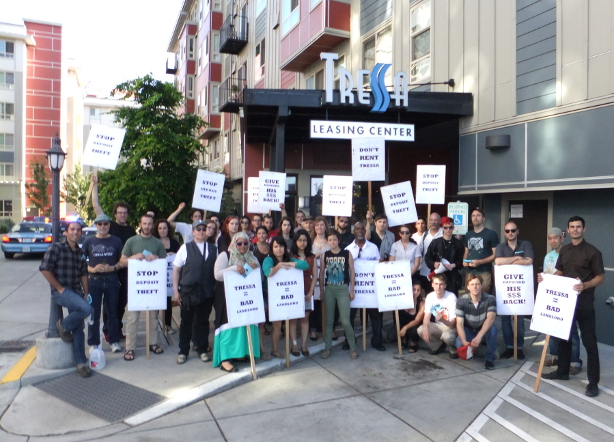
Initiate campaigns of escalating direct action to fight unfair treatment from bosses, landlords and other institutions which hold power over our lives. Here Seattle Solidarity Network picket a business which has unfairly fired and stolen wages from a fellow worker. Tactics include rent strikes, economic blockades, pickets and demand delivery letters.
Workers across Australia were among the first in the world to use the strike weapon for ecological, social & environmental purposes. The culture of ‘Green Bans’ was influenced by and spread way beyond the union structure. The ‘social issues’ which the green bans movement took on, such as Aboriginal & women’s issues, are particularly interesting and demonstrate the type of political-economic organisation that Anarcho-syndicalists point 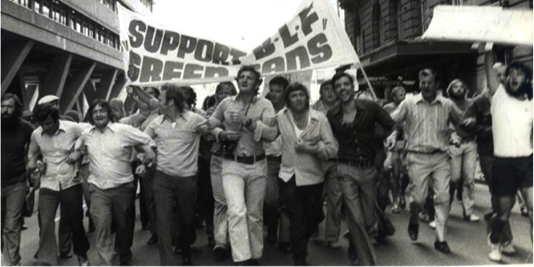 towards. In 1973 for example workers imposed a green ban supported by university students when the university discriminated against a gay student. In the same month, a similar ban was imposed at Sydney university when the philosophy department refused to allow a course in feminist thought and issues.
towards. In 1973 for example workers imposed a green ban supported by university students when the university discriminated against a gay student. In the same month, a similar ban was imposed at Sydney university when the philosophy department refused to allow a course in feminist thought and issues.
Since their revolt against the imposition 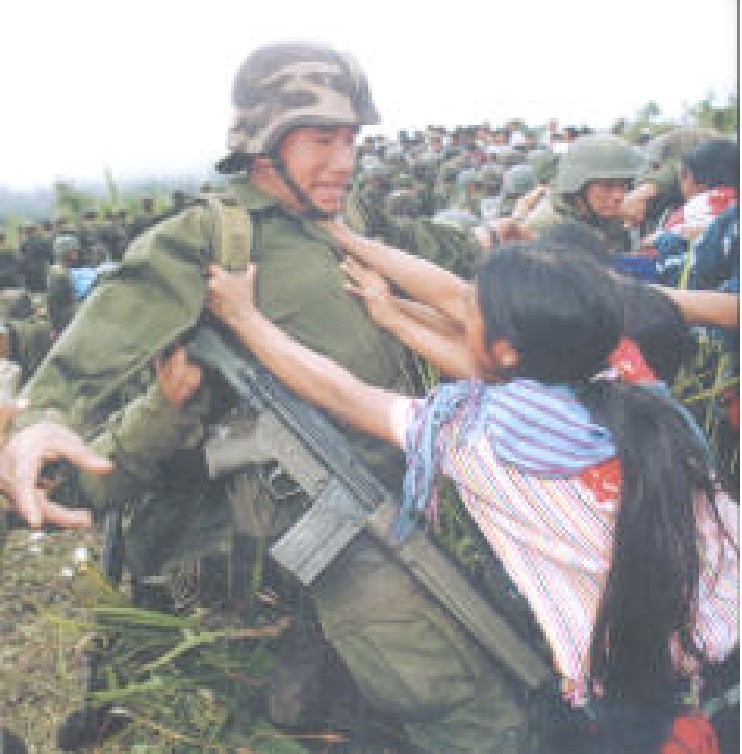 of NAFTA in 1994, the Zapatistas in Chiapas have maintained a revolutionary struggle for a ‘world where many worlds can exist’. Their emphasis on direct action, direct-democracy and organising ‘from below’ embodies the kind of world they want to see.
of NAFTA in 1994, the Zapatistas in Chiapas have maintained a revolutionary struggle for a ‘world where many worlds can exist’. Their emphasis on direct action, direct-democracy and organising ‘from below’ embodies the kind of world they want to see.

Instead of top down bureaucratic hierarchies anarchists talk about federalism – a ‘bottom up’ way of organising that is literally the opposite of a hierarchy. Where hierarchies use ‘representatives’ who give orders from the top, anarchist-federalism starts at the bottom with the base, and uses systems of direct democracy and rotating, re-callable delegates to carry out mandates (binding decisions) who return to the assembly of people in all spheres of social life – whether that be in a workplace, in a social-movement or in a neighbourhood. Popular control means that organisations carry out the will of the people and ensures that they can’t be sold out or demobilised from above — or used as springboards for bureaucrats and career politicians. Broadly, anarchists envisage this style of directly-democratic unionism and organisation as laying the basis for a new world in the shell of the old.
“The federal principle has expressed itself 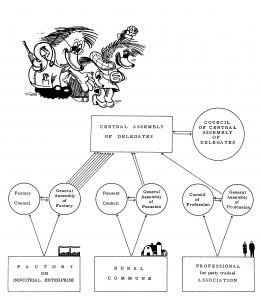 naturally in all major working class struggles, most fully through the formation of Workers Councils. This principle posits that federalism should operate from the simplest level of society. The organisation of administration should begin locally and as near the direct control of the people as possible; workplace and neighbourhood assemblies federating into communes and associations. Above that primary level the confederal organisation would become less an organ of administration than of coordination between local units. Thus the Nation State could be replaced by a geographical confederation of regions.”
naturally in all major working class struggles, most fully through the formation of Workers Councils. This principle posits that federalism should operate from the simplest level of society. The organisation of administration should begin locally and as near the direct control of the people as possible; workplace and neighbourhood assemblies federating into communes and associations. Above that primary level the confederal organisation would become less an organ of administration than of coordination between local units. Thus the Nation State could be replaced by a geographical confederation of regions.”
— Colin Ward, Anarchy in Action
![]()
In 1987, when the Spanish governm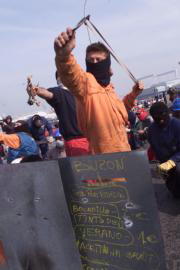 ent announced a programme of ‘rationalisation’ at the Puerto Real shipyards, the workforce came out on strike. The Anarcho-Syndicalist CNT was at the forefront in spreading the action to the surrounding population. Not only was the government defeated, but a number of pay and condition improvements were secured.
ent announced a programme of ‘rationalisation’ at the Puerto Real shipyards, the workforce came out on strike. The Anarcho-Syndicalist CNT was at the forefront in spreading the action to the surrounding population. Not only was the government defeated, but a number of pay and condition improvements were secured.
The most noteworthy development was the spread of mass assemblies both in the shipyards and the surrounding communities. These assemblies were the sovereign bodies of the struggle, controlling it from the bottom up. People decided for themselves, rejecting control by unaccountable politicians, union officials or ‘experts’ and ensuring control remained in the workplace and locality. The CNT did not seek to get everyone in the shipyards and surrounding communities to join it and then declare a strike (although their levels of membership and longer-term agitation certainly contributed to their influence), but when the rationalisations were announced they sought instead to initiate mass assemblies open to all workers regardless of union membership, whilst arguing for the core anarcho-syndicalist principles of solidarity, direct action and rank-and-file control.
“Not only did the great determination and ingenuity on the part of the [Puerto Real] workers bring results, but that of the communities too. Mass assemblies both in the yards and surrounding localities involved workers, their families, neighbours and all supporters. Initiating and maintaining entire communities’ involvement in mass assemblies alone was fine achievement.” – Solidarity Federation (1995)
![]()
“Direct Action is the symbol of revolutionary unionism in action…It is a notion of such clarity, of such self-evident transparency, that merely to speak the words defines and explains them. It means that the working class, in constant rebellion against the existing state of affairs, expects nothing from outside people, powers or forces, but rather creates its own conditions of struggle and looks to itself for its means of action. It means that, against the existing society which recognises only the citizen, rises the producer. And that that producer, having grasped that any social grouping models itself upon its system of production, intends to attack directly the capitalist mode of production in order to transform it, by eliminating the employer and thereby achieving sovereignty in the workshop – the essential condition for the enjoyment of real freedom. Direct Action thus implies that the working class subscribes to notions of freedom and autonomy instead of bowing before the principle of authority. Now, it is thanks to this authority principle, the pivot of the modern world – Parliamentary Democracy being its latest incarnation – that the human being, tied down by a thousand ropes, moral as well as material, is denied any opportunity to display will and initiative.”
– Emile Pouget, Direct Action & Sabotage
“Political rights do not originate in parliaments; they are, rather, forced on parliaments from without. And even their enactment into law has for a long time been no guarantee of their security. Just as the employers always try to nullify every concession they had made to labour as soon as opportunity offered, as soon as any signs of weakness were observable in the workers’ organisations, so governments also are always inclined to restrict or to abrogate completely rights and freedoms that have been achieved if they imagine that the people will put up no resistance. Even in these countries where such things as freedom of the press, right of assembly, right of combination and the like have long existed, governments are constantly trying to restrict these rights or to reinterpret them by juridical hair-splitting. Political rights do not exist because they have been legally set down on a piece of paper, but only when they have become the ingrown habit of a people, and when any attempt to impair them will meet with the violent resistance of the populace. Where this is not the case, there is no help in any parliamentary Opposition or any Platonic appeals to the constitution. One compels respect from others when one knows how to defend ones dignity as a human being. This is not only true in private life, it has always been the same in political life as well.”
— Rudolf Rocker, Anarcho-Syndicalism
If we look at the whole history of the last 300 years we see that the legacy of the few rights and social gains which we enjoy today weren’t granted as gifts from above or because we asked nicely through reports and funding proposals— they were won and forced upon the system through popular struggle and are eroded unless they are maintained through struggle. Capitalist society is not a debating chamber based on rational arguments, but a power struggle between different groups and classes with competing and opposing interests. We want a stable home; the landlord wants an asset that will make them a lot of money. We want better conditions and meaningful work; the boss wants a bigger profit margin. When popular struggle is strong, we often win concessions, when it is weak, the State attacks and dismantles our gains. The paradox is without the threat of social-revolution, reformism is a non-starter. Improvements to our lives are not handed down from above. They must be (and have always been) fought for.
Instead of getting caught up as individuals in bureaucracies anarchists talk about collective direct-action. Put simply, direct action is when people take action to further their goals, without the interference of a third party. It relies on building our collective strength to stop ‘business as usual’ rather than our individual lifestyle choices or appeals to politicians and union leaders. It means relying on each other – the others who share our situation – rather than on ‘experts’. Whether we have Parliamentary democracy or dictatorship, the seemingly insurmountable problems facing the planet and its peoples will not be solved by a few at the top issuing decrees, manipulating public opinion or pursuing their own agendas. Instead of buying into political games and parliamentary processes, we think it’s more important to organise with each other on a permanent basis within and across workplaces, industries and communities as a step towards democratising society down to its very roots.
Direct action takes place at the point where we experience the sharp end of capitalism. Often this will mean where we work, as our bosses try to sack us or make us work harder, for less money. Or it can be where we live, as local politicians try to cut spending by getting rid of public services. Direct action means organising in a way that fosters confidence and self-activity and includes everything from occupations, strikes (general or otherwise), sabotage, economic blockades and boycotts, to disruptive action, grassroots education and distributing material. It means fighting to improve our conditions while at the same time prefiguring (that is, embodying aspects of) the alternative types of social relationships we want to see. It means to contribute towards rebellious practices, experiments, cultures of hospitality and solidarity, spaces and structures of co-operation, self-education and self-rule – to have both a foot in this world and to step into one that we want. We call this ‘dual power’ – Building the new world in the shell of the old.
![]()
‘Revolution is the creation of non-profit, non-mercantile, co-operative and fraternal social relations, which implies smashing the State apparatus and doing away with the division between firms, with money as the universal mediator (and master), and with work as a separate activity. That is the content… this content won’t come out of any kind of form. Some forms are incompatible with the content. We can’t reason like the end was the only thing that mattered: the end is made out of means.”
– Gilles Dauvé
![]()
 The working class responded to an attempted military coup in the streets, launching a profound social revolution during which millions participated in seizing and reorganising agriculture, entertain, services, industry and society from the bottom up according to the anarchist idea of ‘libertarian-communism’.
The working class responded to an attempted military coup in the streets, launching a profound social revolution during which millions participated in seizing and reorganising agriculture, entertain, services, industry and society from the bottom up according to the anarchist idea of ‘libertarian-communism’.
Collectivised bus services run by Anarchists during the uprising in Spain, 1936.
Click here for a documentary: ANARCHISM IN ACTION on the social revolution in Spain 36.
It would be facile and pretentious to claim that we have “answers”. Walking, we ask questions. For one thing, as long as this society remains based on profits and the power of corporations and governments, and as long as the important decisions that affect us remain in the hands of entrenched authorities and bureaucracies, the problems of survival and the difficulties in creating bonds of trust and friendship can only be partly and temporarily resolved. The pressure of earning a living already limits our choices considerably.
“So long as the immense majority of the populations are dispossessed of property, deprived of education and condemned to political and social nonbeing, so long as labour continues to be the slave of private property, the State and of capital, so long as human society continues to be divided into different classes as a result of the hereditary inequality of occupations, of wealth, of education, and of rights, there will always be a class-restricted government and the inevitable exploitation of the majorities by the minorities, with all the social dysfunction that this entails.” — Mikhail Bakunin
The last 30 years have left our communities in a bad state. Unfortunately several decades of defeat for the working class, whether it be around war, conditions or the environment, has left very unhelpful attitudes such as an expectation of attack coupled with an expectation of defeat. Residents and Tenants Associations, where they exist, are often co-opted by council’s and are weak or disorganised. Not only do most unions now openly declare their role as mediation and negotiation –an integral part of business and the legal system— all registered unions now, if they did want to take action, are forced into taking a stance of negotiation to survive – why risk a stable job (which the union is) or a $25,000 fine? Campaigns (often single issue) spring up and disappear, occasionally win, but lessons are lost and mistakes are repeated. With strike action basically illegal in Queensland there is not much opportunity for learning from progressive builds in struggle. Working class power has been smashed. Old centres of militancy in the mines and car plants have been shut down and/or off-shored. Service-sector militancy is more a hypothetical concept than a successor. In terms of organising, this sounds bleak.
The world has moved forward, of course, but for many people in the working class we have moved backward. When we look at historically significant working-class fighting organisations (like the CNT and IWW back in the 30s’) we have to look at how they developed. At present our tasks are much like the tasks of the people in the early 1900’s. Workers are not organised, we don’t have a fighting organisation and our links where they exist are very loose. We may be involved in addressing all sorts of issues – housing, the environment etc – what’s needed to complement this is a practice that sees the links between these issues and out of which can emerge a relevant and coherent critique – one that can pull together a truly transformative project – a process of social mobilisation from below. As a first step toward that process, we need more confident, capable, committed organisers. We are at the early stages of picking winnable fights through whatever networks we’re involved with, involving people beyond our existing milieus, organising on the basis of shared material interests, building a capacity for collective action and hence power to take on employers, landlords, temp agencies etc. And doing all this together autonomously from trade unions, political parties and without relying on the legal system.
“To organise is always a necessity, but the fixation on your own organisation can be perilous. Against that we believe in the diversity of groups and organisations, that arises from different situations and fulfil different needs in the flow of class struggle. Some are more temporary, while others are continuous.”
– Riff Raff (1999)
The establishment and growth of true popular control has always been a prospect greatly feared by ‘the masters of humankind’, who understood that it can only impede the pursuit of their maxim ‘all for ourselves, and nothing for other people’. This is a world for owners, not for people. A short-sighted world where profit is placed above all, a world without ecological relationships of care, social relationships of care or spiritual relationships of care. What we need is a process of self-organisation – Not another movement that acts as a trampoline for career politicians and lobbyists. We need to create space to re-meet each other where we’re at – in our workplaces industries and offices, in our unemployment, in our isolation and frustrations.
Anarcho-syndicalism is commonly associated with particular organisational forms, namely revolutionary unions, mass meetings and mandated, recallable delegate councils. But it cannot be forgotten that these forms are necessarily the expression of some content: Class struggle & self-organsation. This is much like how a pot-maker can fashion many forms from a single lump of clay, but cannot fashion anything without the clay to start with. Structure requires substance, content precedes form. However we are not philosophers interested in such niceties for their own sake, but for their practical implications.
– Solidarity Federation
The best statutes and constitutions can only have meaning to the extent that people are permanently prepared to defend what is best in them, to make up what they lack, and to change whatever they may contain that has become inadequate or out dated. Freedom cannot be imposed or legislated from above. Even in a revolutionary situation we can’t fetishize a particular form of organisation; what matters is the content. For example, the constant eligibility and revocability of delegates are of themselves quite insufficient to ‘guarantee’ that a Workers Council will remain the expression of working class interests. The council will remain such an expression for as long as people are prepared to do whatever may be necessary for it to remain so. The achievement of the free society is not a question of better legislation; it depends on the constant self activity of people and on their capacity to find within themselves the necessary awareness of means and ends, the necessary solidarity and determination. The difference is a Workers Council is designed as the expression of working class self-activity but may cease to fulfil this function. Parliament on the other hand is designed so as not to represent the people and never ceases to fulfil this function. We must understand that real democracy and popular control is always infinitely precarious and is mortally endangered by every new progress. It must be forever started again, reconstructed.
Rage is easy, sabotage appealing, but systematic opposition, methodical and effective— that’s another thing. There is much more that has to happen. We have so much to do.
“One must try to increase as much as possible the theoretical content of all our activities, but without the ‘dry and shrivelled doctrinalism’ which could destroy in part the great constructive action which our comrades are carrying forward in the relentless fight between the haves and the have nots. Our people stand for action on the march. It is while going forward that we overtake. Don’t hold them back, even to teach them ‘the most beautiful theories’…”
– Francisco Ascaso
To have endless expansion and profit as the guiding principles of society is social and ecological ruin; to counter this we need to struggle from below for a society based on fundamentally different values. Where work is performed because it is useful, not because it makes money. A society that ecologically sustainable. A society where the heart of our decision making lies in popular power from the bottom up, not above us inside the hierarchies of grand capitalist bureaucratic orders. To bring back life in all its completeness, a world where we don’t just survive, but flourish.
and profit as the guiding principles of society is social and ecological ruin; to counter this we need to struggle from below for a society based on fundamentally different values. Where work is performed because it is useful, not because it makes money. A society that ecologically sustainable. A society where the heart of our decision making lies in popular power from the bottom up, not above us inside the hierarchies of grand capitalist bureaucratic orders. To bring back life in all its completeness, a world where we don’t just survive, but flourish.
The important question is not whether such a society is possible or not, but whether we can so enlarge the scope and influence of libertarian/anarchist methods in all spheres of life so that they become the normal way in which human beings organise society. Anarchism is a means; it has no end. The choice between libertarian and authoritarian solutions is not a once-and-for-all cataclysmic struggle; it is a series of running engagements, most of them never concluded, which occur, and have occurred throughout history.
Everything we know about social revolutions suggests they are messy, contradictory processes, an open clash of opposing forces that sees advances and retreats, consolidations and capitulations. They proceed unevenly in fits and starts, ebbs and flows, and all the more so when we’re not talking about the overthrow of one state, but 200 or more! The rupture with capitalism is likely to follow this pattern, developing unevenly, with revolutionary surges battling counter revolutionary inertia and attempts to restore the sanctity of private property. Some of these clashes are likely to be armed. However, revolution is not principally a military question but a social one.
The libertarian communist revolution is a process. It is a movement. It will likely develop and blossom from strike waves to expropriations over a period of years. This isn’t a ‘transitional phase’, it is what the revolution is. We do not wake up one morning and find that libertarian communism has been proclaimed. We seize back society from capital and the state as much as we can, and push for libertarian communist social relations as much as possible.
